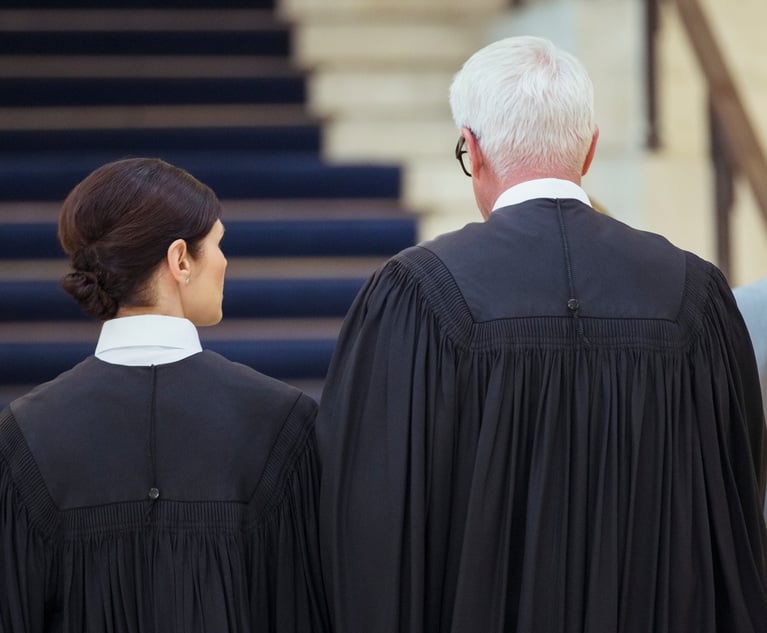 Chief Judge Thomas Thrash Jr. of the U.S. District Court for the Northern District of Georgia is presiding over the case. (Photo: John Disney/ ALM)
Chief Judge Thomas Thrash Jr. of the U.S. District Court for the Northern District of Georgia is presiding over the case. (Photo: John Disney/ ALM)Lawyers in Equifax Data Breach Case Want Material Surrendered to Congress
Plaintiffs counsel are seeking documents used in a congressional report that found the company's massive data breach was preventable.
December 13, 2018 at 12:05 PM
4 minute read
Attorneys suing Atlanta-based credit bureau Equifax on behalf of consumers and financial institutions in a massive class action stemming from the firm's 2017 data breach want documents and witness statements the company turned over to Congress.
On Wednesday, less than 24 hours after a congressional committee released a 96-page report finding the breach was preventable, plaintiffs lawyers filed a motion asking for the materials that served as the basis for that report.
Plaintiffs counsel is seeking the information because the rules in the U.S. District Court for the Northern District of Georgia generally preclude discovery until after a judge has ruled on motions to dismiss. As a result, once defendant parties move to dismiss a case, little or no discovery occurs until after the court rules.
The U.S. House Committee on Oversight and Government Reform released a majority report Tuesday that concluded the data breach that exposed personal and financial data of an estimated 148 million consumers was preventable.
Attorneys are expected to face off Friday before Chief Judge Thomas Thrash Jr. for a daylong hearing on Equifax's motions to dismiss pending claims.
Co-lead plaintiffs counsel for the consumer plaintiffs are Amy Keller of DiCello Levitt & Casey in Chicago, Ken Canfield of Doffermyre Shields Canfield & Knowles in Atlanta, and Norman Siegel of Stueve Siegel Hanson in Kansas City, Missouri.
Co-lead counsel for the financial institutions include: Craig Gillen of Atlanta's Gillen, Withers & Lake; Ranse Partin of Atlanta's Conley Griggs Partin and MaryBeth Gibson of Atlanta's The Finley Firm.
Equifax is represented by a team of King & Spalding attorneys led by David Balser and Phyllis Sumner in Atlanta.
Plaintiffs counsel pointed to 122,000 pages of documents from transcribed interviews with three former Equifax employees “directly involved with” the credit bureau's information technology department and a “trove of documents on file with committee.” Those documents include witness interview transcripts, emails, incident response charts, security audits, internal policies and procedures, and expired digital security certificates.
“All of these documents are highly relevant to this litigation,” plaintiffs' counsel said. They also suggested it will be more efficient to produce the information already provided to Congress now, rather than after Thrash rules on the motions to dismiss.
“Presumably, a meaningful review of the documents in the civil litigation will also take months to conduct,” the motion said. “There is no need to impose this additional delay in these cases of great public importance.”
It is not the first time plaintiffs lawyers have asked for materials that Equifax turned over to the House oversight committee. They first asked Thrash to lift the discovery stay regarding all material turned over to Congress in October and suggested that Equifax had balked at providing preliminary information that would allow them to tell the judge what discovery they intended to seek and “avoid months of dead time.”
Equifax has informed plaintiffs counsel that it would not provide any documents before discovery formally opens and has cited employee nondisclosure agreements that would bar Equifax employees from disclosing company information.
Equifax lawyers have asked Thrash to deny the request.
“To depart from this court's local rules and the mutually agreed-upon scheduling order, plaintiffs must show good cause why discovery must be obtained now and not after the forthcoming ruling on the pending motions to dismiss,” Equifax lawyers responded.
“Plaintiffs' specific discovery requests—seeking every document Equifax provided to any government regulators, up to five depositions, … and the production of documents from multiple third parties—far exceed the scope of permissible discovery at any time and would only invite further discovery disputes before this court at a time when the Court is otherwise focused on the threshold motions to dismiss.”
This content has been archived. It is available through our partners, LexisNexis® and Bloomberg Law.
To view this content, please continue to their sites.
Not a Lexis Subscriber?
Subscribe Now
Not a Bloomberg Law Subscriber?
Subscribe Now
NOT FOR REPRINT
© 2025 ALM Global, LLC, All Rights Reserved. Request academic re-use from www.copyright.com. All other uses, submit a request to [email protected]. For more information visit Asset & Logo Licensing.
You Might Like
View All

Spalding Jurors Return $12M Verdict Against State Farm Insurance Client
10 minute read

Trending Stories
Who Got The Work
Michael G. Bongiorno, Andrew Scott Dulberg and Elizabeth E. Driscoll from Wilmer Cutler Pickering Hale and Dorr have stepped in to represent Symbotic Inc., an A.I.-enabled technology platform that focuses on increasing supply chain efficiency, and other defendants in a pending shareholder derivative lawsuit. The case, filed Oct. 2 in Massachusetts District Court by the Brown Law Firm on behalf of Stephen Austen, accuses certain officers and directors of misleading investors in regard to Symbotic's potential for margin growth by failing to disclose that the company was not equipped to timely deploy its systems or manage expenses through project delays. The case, assigned to U.S. District Judge Nathaniel M. Gorton, is 1:24-cv-12522, Austen v. Cohen et al.
Who Got The Work
Edmund Polubinski and Marie Killmond of Davis Polk & Wardwell have entered appearances for data platform software development company MongoDB and other defendants in a pending shareholder derivative lawsuit. The action, filed Oct. 7 in New York Southern District Court by the Brown Law Firm, accuses the company's directors and/or officers of falsely expressing confidence in the company’s restructuring of its sales incentive plan and downplaying the severity of decreases in its upfront commitments. The case is 1:24-cv-07594, Roy v. Ittycheria et al.
Who Got The Work
Amy O. Bruchs and Kurt F. Ellison of Michael Best & Friedrich have entered appearances for Epic Systems Corp. in a pending employment discrimination lawsuit. The suit was filed Sept. 7 in Wisconsin Western District Court by Levine Eisberner LLC and Siri & Glimstad on behalf of a project manager who claims that he was wrongfully terminated after applying for a religious exemption to the defendant's COVID-19 vaccine mandate. The case, assigned to U.S. Magistrate Judge Anita Marie Boor, is 3:24-cv-00630, Secker, Nathan v. Epic Systems Corporation.
Who Got The Work
David X. Sullivan, Thomas J. Finn and Gregory A. Hall from McCarter & English have entered appearances for Sunrun Installation Services in a pending civil rights lawsuit. The complaint was filed Sept. 4 in Connecticut District Court by attorney Robert M. Berke on behalf of former employee George Edward Steins, who was arrested and charged with employing an unregistered home improvement salesperson. The complaint alleges that had Sunrun informed the Connecticut Department of Consumer Protection that the plaintiff's employment had ended in 2017 and that he no longer held Sunrun's home improvement contractor license, he would not have been hit with charges, which were dismissed in May 2024. The case, assigned to U.S. District Judge Jeffrey A. Meyer, is 3:24-cv-01423, Steins v. Sunrun, Inc. et al.
Who Got The Work
Greenberg Traurig shareholder Joshua L. Raskin has entered an appearance for boohoo.com UK Ltd. in a pending patent infringement lawsuit. The suit, filed Sept. 3 in Texas Eastern District Court by Rozier Hardt McDonough on behalf of Alto Dynamics, asserts five patents related to an online shopping platform. The case, assigned to U.S. District Judge Rodney Gilstrap, is 2:24-cv-00719, Alto Dynamics, LLC v. boohoo.com UK Limited.
Featured Firms
Law Offices of Gary Martin Hays & Associates, P.C.
(470) 294-1674
Law Offices of Mark E. Salomone
(857) 444-6468
Smith & Hassler
(713) 739-1250






